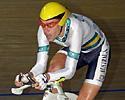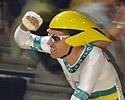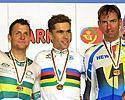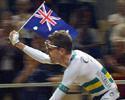
Recently on Cyclingnews.com |
Brad McGee - Rocking at 58km/h
Interview by Rob Arnold/rob@ridemedia.com.au
 |
One rider who needs little introduction is Brad McGee. The 28-year-old won his first world championship as a junior back in 1993. It was the 3,000m individual pursuit title. Nine years later, he's a multiple Olympic and Commonwealth Games medallist, a Tour de France stage winner and a household name. And after the championships in Copenhagen, he's a world champion again. This time in the senior ranks.
It's not the first time that the youngest of the four McGee brothers has earned the right to wear the rainbow colours of world champ. The coloured stripes which appear on the sleeves of his FDJeux.com team jersey signify his world-beating achievements with the pursuit team back in 1995 when he raced as part of a collective which included Stuart O'Grady, Tim O'Shannessey, Dean Woods and his brother, Rodney.
"I was really excited in 1995," said McGee about his first senior title. "I still would be if I won the team pursuit. I love racing with the team because you're racing for Australia and that's something I will always love to do. But the win in '95 was a little different because I was not only riding for Australia, I was racing with my brother."
It would be easy to turn this article into a retrospective of McGee's impressive career but, in all honesty, it's too early to reminisce about what has already been. There's still a lot more to come. That was almost not the case, however, after his Olympic experience in Atlanta. Brad is the first to admit that after winning bronze medals in the team and individual pursuits in 1996, he was prepared to give up on cycling. It was only the persistent efforts of his FDJeux.com team director, Marc Madiot, that prompted Brad to have a go at road cycling at the elite level.
 |
"I wanted to ride the Olympics and in 1996 I did just that," is how Brad began to explain his true conversion to road racing. "I got home from Atlanta and started drinking beer. I wasn't really thinking about what I'd do next with my life. Marc kept on calling me and insisting that I look at a contract he'd drawn up for me. I kept resisting but eventually I agreed."
This statement was made in the video conference bus after his win in Avranches in July 2002. It's not the sort of story journalists are used to hearing after a rider claims a stage of the Tour de France and the statement was met with a mixture of noises: laughter from some surprised journos who undoubtedly appreciated McGee's reference to beer, and then there was the sound of frantic shorthand scrawls from the others who couldn't quite believe Brad would be so blasé about the talent he obviously possesses. It was enough to convert many in the press room. McGee, they began to understand, was not only gifted on the bike but he could tell a good yarn too.
After the medal presentation in Copenhagen, McGee felt that he'd played a small part in another transformation.
"Marc made a big turn around after I won," said McGee. "His comments were: 'I can't understand why track cycling isn't as popular as it should be. It's exciting, it's fast, it's right in front of you and it looks great on television'. He's now realising that it's a fantastic aspect of the sport. You can't find a harder road man than Marc Madiot and if he thinks the track has got something to give, then it obviously has."
So which win was sweeter, the Tour stage or the pursuit? "You can't compare the track and the road," said McGee in response to the obvious question. "They're like two different sports. I'm just fortunate enough to be able to do them both well. The Tour stage win and the world championships are equivalent to each other because, for me at the moment, they're the pinnacle of what I'm trying to do."
There are many things that McGee is trying to do. And a lot of these things relate to giving cycling a larger profile in Australia. "There are a few more objectives I'd like to achieve," said McGee at a testimonial dinner in Sydney in November. "Win an Olympic gold medal, wear the Tour's yellow jersey and be part of an Australian professional team."
 |
He may be a champion and he has big ambitions to keep his motivation high, but that doesn't mean McGee is always organised. He's often late for appointments and frequently distracted by the numerous side projects he's working on - be it the Australian distribution of his team's Lapierre bikes or the part he played in establishing the FDJeux.com/NSW Institute of Sport development team - but his mind is always on cycling. And that includes looking at what is being done to ensure that track cycling doesn't suffer because of the popularity of road events.
"The track has gone backwards lately, but it's mainly because of the number of competitions that are supporting it," explained Brad who clearly understands both disciplines intimately. "Track cycling has got a lot of tradition, it's been going on for years and it's well supported by the Olympics. But it's the road that has a huge race calendar and teams built around these events."
It's nothing new to most observers, but McGee can see some promise in plans being considered by the sport's governing body, the UCI. "I've heard that they are going to offer UCI points for track racing now. That may entice pro teams to include a couple of track riders in their line-up. If that happens, riders can take on track racing with a professional attitude just like on the road. And then the points come back to the team... that scenario could really boost track cycling because it involves the infrastructure of a pro scene which is really developed.
"Professional teams already realise that there's big publicity in winning world track championships... but it's got to go that step further from just publicity. If there were 200 points to win a world track championships, it would be a big incentive. That number of points could be crucial to being just inside or just outside the top teams of the year for a squad like FDJeux.com."
He has appreciation of what's required for promotion, but McGee is also in control of the training program which saw him finish three pursuits in one day, all of them in under four minutes, 20 seconds! He qualified fastest in 4:19.290, and was just seven-1,000ths of a second slower in the next round. Later that night, he won the final in 4.17.875 - and, he claims, most of it is thanks to the work he's done on the road.
"I was just rocking!" he said of his final ride on the opening night of competition at the worlds. "I've found an awesome style on the big gears using my road strength. Given that it was the third ride in the same day, I was impressed with the speed and the time I did in the final. It was probably a better ride than the Commonwealth Games because it was the third effort of the day."
His association with the pursuit coach, Ian McKenzie, is kept to a minimum. "He's happy to see me run my own program so I don't have much to do with him," said Brad about McKenzie. "I appreciate the way he works with me, just letting me do my own thing. He's always there if I need him, but I just haven't seen the case arise when I do need much assistance from him.
"When I went to Buttgen about a week before the track worlds, just to say hello to the boys really, he made the comment to the staff that if anyone saw me throwing a leg over a track bike, they were to crash tackle me. Knowing how quiet Ian is, I thought I'd better make that comment because it's pretty funny."
 |
McKenzie has had incredible success this year but he did miss an opportunity to tackle Brad. "The fact is," said Brad, "I did actually sneak down to the track and do a little session with no one looking. I put double disc wheels on the bike and rode around a bit on a little gear. Then I went back in the shed and put a 53x13 on and came out and did a couple of jumps - some flying one kilometres - because I knew that if anyone was ever going to pressure me at the worlds, I'd have to ride that gear. As it turned out, I didn't really have to worry about the opposition."
The only rider McGee really had to pay attention to was his team-mate, Luke Roberts, who topped off an awesome season by finishing with the silver medal behind Brad and gold in the team pursuit. "Finally, Luke is doing what we all thought he could do," said McGee. "He's got a huge physical capacity and mentally he seems a lot more confident this year, and that's showing in his performances. In the team pursuit, the guy is doing two-lap turns at an incredible pace - speeds no one has ever seen, obviously, because they've got the world record. He should go down as one of the greats of all time in team pursuiting."
McGee is keen on analysis. Nothing much is left to chance when it comes to understanding what is required to achieve cycling success. From his friendly manner with the media through to his appreciation of coaches and team-mates, he's the complete package. On top of it all, he knows just what is required to ride the lung-busting four kilometres of the pursuit without losing momentum toward the end. So what's the secret?
"You've got to know how to get out of the starting gate," said Brad, offering advice with far more alacrity than the dull tips you get from Tony Greig during the cricket coverage. "If you do it properly, you can actually get a big advantage out of it. You can almost jump out - really slingshot out of the gates. Then the trick is knowing where and when to lay the power down in and out of the bends. All the while, you've got to be as relaxed as possible so you don't load the body up with too much lactic acid.
"It seemed that whatever speed I could get in the first kilometre was locked in and I was never ever slowing down. I was only getting quicker. Once I get the speed up and running, I just tick through to the line."
He makes a pursuit seem like a pleasurable jaunt around the local park, but that's not what these races are like. Pursuits are painful, torturous and energy-sapping affairs which, when finished, leave your body screaming for air. Unless you're Brad McGee, in which case they end with victory salutes and gold medal presentations. But he's probably done more pursuits in the last 10 years than anyone reading this magazine, so just how does a pursuit now compare to those distant days as a junior?
"Oh, they're a dream! They're definitely not as painful as they used to
be. The bigger gears have changed a lot the energy systems I tap into. As far
as physical pain, they don't hurt as much but they involve a huge strength effort
now. It's like I'm in a squat rack for four and a half minutes now, where before
it was like I was running up a sand dune. That's the difference."
Rob Arnold is the publishing editor of Ride Cycling Review. This article appeared in the latest edition of Ride Cycling Review. For further information about this title and to subscribe, click here
For more information on Brad McGee, visit his website or for Australians, watch SBS's new Cycling show, Cycling Weekly, at 5:30 on Sunday, January 19, for an interview with Brad McGee.
